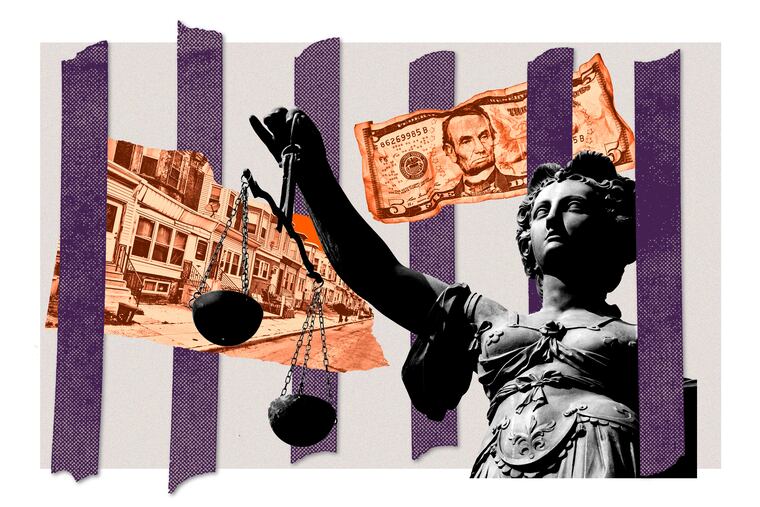Our minimum wage of $7.25 hasn’t changed for 14 years. This is oppression, plain and simple.
The $7.25 minimum wage hasn't changed for 14 years, ensuring that those with the least struggle the most. Communities like Philadelphia should be able to break from Harrisburg and right this wrong.

As a faith leader and organizer for social justice, I often pray with families looking for a little help here and there: help with medical bills, help finding housing, help doing more with less in places where the minimum wage has stagnated for 14 years.
That is especially true in Philadelphia, but it’s now the case across the commonwealth. With our state and local minimum wage stuck at the federal minimum of $7.25, workers cannot survive.
» READ MORE: Philadelphia’s ‘real minimum wage’ is among the worst in the U.S.
A Pennsylvanian who started working in 1998 has seen the minimum wage go up by about $2 in the ensuing 25 years. That is unfair. A parent in Philadelphia, where the living wage for a single parent and child is over $35 per hour, now has to work more than three minimum wage jobs just to afford a two-bedroom apartment.
That is immoral.
Yet, from Pittsburgh to Allentown to Lancaster to my hometown of Philadelphia, locally elected leaders are preempted under state law from setting a minimum wage that makes sense for our communities. The state legislature prohibits municipalities from determining their own minimum wage. This iniquity silences the voices of citizens and their local representatives alike, disproportionately impacts people of color, and ensures that those with the least struggle the most.
Preemption is not merely a budgetary quirk: It is a racial justice issue and a barrier to income equality in Pennsylvania.
I believe passionately in principles of social justice, and I’m reminded of the words of the prophet Isaiah: “Woe to those who make unjust laws, to those who issue oppressive decrees, to deprive the poor of their rights and withhold justice from the oppressed of my people” (Isaiah 10:1-2). We have a duty to correct this oppression of working families, especially of Black and brown families. It is in our power to uplift every Pennsylvanian by raising the wage across the commonwealth to fair levels.
We have a duty to correct this oppression of working families.
The unfairness of wage preemption robs each Pennsylvanian of their opportunity to earn decent pay for their work. In cities, this punishes communities of color particularly, but it also keeps rural laborers in poverty and makes suburban seniors compete with teens for spots at the bottom of our socioeconomic ladder. In cities and counties, our municipal representatives are elected to set policy that makes sense for residents, but without a livable wage, how can we hope to thrive?
Every Pennsylvanian deserves to have their basic economic needs met, regardless of race or age or where they live. That is not possible if wage preemption remains in our budget. This makes ending preemption a righteous cause and a moral imperative for the next budget session.
Without a livable wage for families in Pennsylvania, we cannot make progress with any of the crises of economic and racial injustice harming communities throughout the state. Raising the wage means more housing access, better health care, fewer struggles with addiction, decreased gun violence, and more affordable childcare. Our next state budget offers us a route forward if we fight to achieve it.
House Speaker Joanna McClinton and Senate President Pro Tempore Kim Ward must work together to raise the wage and end preemption. To fail would be an act of political malfeasance that not only prolongs poverty in the present but guarantees poverty for Pennsylvanian families in the future. Raising the minimum wage to $15 an hour would directly impact 1.6 million Pennsylvanians, including an estimated 200,000 Philadelphians — all of whom would have more money in their pockets to meet their needs.
This issue affects working people across the state: urban, suburban, or rural, and of every race, faith, and creed.
Wage preemption has never made sense in Pennsylvania. We are a large state with multiple, diverse economies. From manufacturing to agriculture to health care, economic conditions differ as we move from Allegheny County east and into the Lehigh Valley, or north toward Lackawanna County. Communities have a right to their say in a collective destiny, and for too long, each has been denied this basic democratic right through preemption.
We need statewide action to raise the wage and put an end to minimum wage preemption in Pennsylvania’s next budget.
Budgets are not policies and economics alone: They are moral documents, and it’s past time for state legislators to prioritize a livable wage and end budget policies that prevent local lawmakers from setting dignified minimum wages for local workers struggling to survive.
Philadelphia ranks as the poorest big city in the country, not by happenstance but by active, discriminatory policy choices like wage preemption that are kept in place, year by year.
My faith calls me to care for the least among us and fight against injustice everywhere. In Pennsylvania, one of our greatest chances to build a more steadfast and fair commonwealth comes in making our state budget a more moral and just document. When we achieve this, we will be one step closer to ensuring every Pennsylvanian can prosper.
Bishop Dwayne Royster is the executive director of POWER Interfaith.